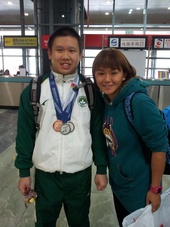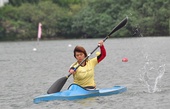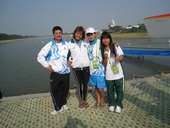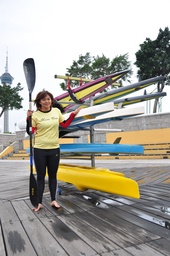
The majority of girls nowadays like preserving a fair complexion and smooth skin. With regard to outdoor activities, the first question they would probably ask is: ‘How much sunscreen should I apply?’ But there is an exception - Chiang Hoi Ian loves suntanned skin. No matter scorching sun, heavy rain or bone-chilling wind, she is not afraid of any kind of inclement weather. During her canoeing career over the space of a decade, she has experienced setbacks, suffered injuries and endured the lowest ebb of her life.
The 25-year-old Chiang has learned persistence through numerous difficulties. Although she has suffered from a variety of sports injuries, as the ‘big sister’ in the team Chiang still harbours wish of participating in the 2014 Asian Games in South Korea. She hopes to make a breakthrough in this important competition to bring down the curtain on her athletic career.
Through the introduction of friends, Chiang was first exposed to canoeing at the age of 13, and immediately fell in love with the sport. She once thought of giving up because of injuries, but with the help and encouragement of her coach she eventually returned to the family of canoeing. Although the training process is rigorous, her enthusiasm for canoeing has never waned. She said, “I don’t care about getting tanned; being exposed to different types of canoe gives me a sense of excitement. Paddling alone is not as boring as people think”.
Chiang enjoys her own time in the canoe, even saying that this helps her eliminate negative emotions. “If I’m in a bad mood, I like to go rowing,” she says. “After venting my frustration, I feel relaxed”.
Always Encountering Setbacks but still takes the Bull by the Horns
Chiang has gone through many twists and turns in recent years. In the 2009 ICF Canoe Sprint World Championships, her canoe accidentally capsized near the finish line, causing her great frustration. Later, she set a goal for herself, which was making a breakthrough in the 2010 Asian Games. This helped her step out of the shadows. Unfortunately, during her preparations for the competition, she was diagnosed with hepatitis.
“The doctor advised me to stop all training. However, I’d invested so much effort in the Asian Games, and I felt that I was in good condition, so I was pretty upset at the time. I eventually convinced the doctor to permit me to continue training”. She ended up breaking the Macao record in the Asian Games in Guangzhou.
“I was thrilled and very excited at that moment, and thought that my entire endeavour had paid off”.
The world of athletes is as simple as that. It makes them very happy to go a minute or even a second faster in their personal record.
Retiring after Asian Games to Cultivate New Blood
Since Chiang joined the workforce, she has had relatively little time for training; thus, she has taken the initiative to offer overseas competition opportunities to junior female members in the hope that they will gain more experience.
“These girls have been training very hard. Although they have not reached my best record, they will grow by joining competitions. This will help them to establish a solid foundation for preparing the future succession”.
Chiang, plagued by injuries, admits that she already has a timetable for retirement, “Canoeing accompanied my growing up. This sport brings me numerous unique experiences, and it’s not easy for me to hang up my paddles. I really hope to participate in the Asian Games again before retiring”.
Planning to hang up her paddles does not mean that Chiang will leave canoeing circles. In fact, she is ready to cultivate more new blood as a coach, and share her valuable experience and knowledge with others. She thinks that canoeing has developed well in Macao in recent years. An echelon has been established to attract more new athletes - and she is devoted to teaching. It is not necessary for her to attract a squad of apprentices before opening a class. As long as two or three parents bring their children along to learn canoeing, she is willing to teach.
Love to Work, Learning Tolerance
Whether in school or at work, Chiang’s life is always about sport. A graduate of the school of physical education and sports at Macao Polytechnic Institute, she is currently working with the Macao Special Olympics as an activity co-ordinator, guiding its members to participate in indoor rowing, canoeing and swimming. Since she has contacted people with intellectual disabilities, she is deeply impressed and hopes that society can eliminate discrimination, investing more care and tolerance in such people.
Instructing People with Intellectual Disabilities
Chiang occasionally volunteered to help the elderly when she was a university student. Later on, introduced by her coach, she had a chance to communicate with the kids in Macao Special Olympics. She then decided to apply for an internship at the Caritas School in Year 4.
She recalls that both her family and friends think her choice is strange but she says, “All the people around me think this decision is pretty weird but I believe this is the right way to go. From the members of Macao Special Olympics, I’ve learned to overcome difficulties. The daily efforts they have to make are a couple of times greater than ours. They’re thrilled at just a little progress, as am I - I’m glad to see them grow up. They remind me that I have a similar journey of exploration”.
Understanding & Family Support
In the process of guiding the members of the Macao Special Olympics, Chiang has learned the skills of getting along with them. She describes herself as a ‘sister’ among those with intellectual disabilities. She is indignant if people give her ‘younger brothers and sisters’ a strange look. “They are able to do what we do. There’s no need to be more intelligent than someone else. As long as they can prove their own capability, no-one should discriminate against them”.
Learning from teaching, since Chiang has become a coach with the Macao Special Olympics, when she encounters a problem she usually seeks the answer from books to improve her knowledge. “I enjoy the job I have at the moment pretty much. My family understand that I have found my own interests, and they give me full support”.






